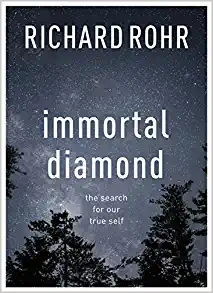This week we are discussing Chapter 5 “Thou Are Thou” of Richard Rohr’s book Immortal Diamond: The Search for the True Self. The theme of this Chapter is that our ultimate end and purpose is union with God. p.95. As Jesus prays, just as he is in the Father so also we find union in them. John 17:21. For the early Church, two of the terms used to express this union were “person” and “eros.” Rohr expresses this ancient Christian understanding when he writes about the “erotic divine union.” (p.110)
The idea of “person” developed in the discussion of the nature of the Trinity. The simplest definition of the Trinity is Three Persons of One Divine Substance. The word “person” necessarily implies a relationship. Our word “person” derives from the Greek word prosopon. This word combines the Greek preposition pros (meaning towards) with the Greek noun ops (meaning face). To be a person means to face towards someone else. A “person” cannot exist in the abstract or individually, but only in a direct face-to-face relationship. “God” fully exists only within the face-to-face relationship of the three persons of the Trinity. Similarly, we fully exist only within our face-to-face relationship with God. It is only the True Self that can be face-to-face with God.
The other historic term used to express the union with the divine is “eros.” Rohr touches on this concept of an erotic divine union. p.110. Like the word “gentlemen” or “adult,” the concept of eros has likewise been corrupted. Just as the common definition of a Romeo as a man who has multiple girlfriends betrays the Shakespearean character who would rather die than forsake his one true love, so “eros” too is the opposite of a lustful desire. Eros is not a lust that springs from a selfish desire to be sexually satisfied, rather eros comes from the acquisitive desire to become united to another in all aspects of life. This erotic desire can only be fulfilled in the giving-up of and losing ourselves to the other.
We see the divine acquisitive desirous love throughout Scripture. The first of the Ten Commandments arises from this acquisitive love. Ex. 20:4. We also see this type of love in the parables of the lost sheep (Luke 15:1-7) or the pearl of great price (Matt. 13:45-46). And for the early church, this type of love is most fully expressed in the Song of Songs.
Within Christian theology (particularly in the Early Patristic Church and the Eastern Orthodox Church), “agape” as a gratuitous benevolent love is wholly indistinguishable from eros as an acquisitive desirous love. On a human level, we can see and experience this within marriage. Ideally, within marriage, each party benevolently and gratuitously gives up of themselves to the other which necessarily results in the acquisition and possession of the other. An acquisitive desire for the other is only fulfilled when the person gratuitously gives up of themselves. Paul writes about this in 1 Corinthians 7 and Ephesians 5:21-33. Within these verses, Paul speaks about how spouses do not belong to themselves but to the other, and must completely sacrifice themselves to the other, just as Christ does for the Church. Through this benevolent self-sacrifice, the erotic union is achieved.
On the divine level, God’s agapic benevolence is also his erotic acquisitiveness of all things to himself. We see this in Paul’s hymn in Philippians 2 where Paul writes about Jesus fully giving of himself which results in all of creation coming to him. The Church Fathers will write of how God’s agapic love to and for all things is also his erotic love of moving all things towards himself, and our agapic self-abandonment of all things to God is our erotic acquisition of him. Therefore, when Paul writes that “It is no longer I who lives, but Christ who lives in me” (Gal. 2:20), Paul is expressing the idea that he has been both possessed and acquired by God’s love and that he now possesses God’s love. In giving up of himself to God, Paul describes his entry into an “erotic divine union” with God.
Dinner is at 6. The menu is muffuletta sandwiches. Discussion about 6:45. Hope to see you here.
Husbands, love your wives, just as Christ loved the church and gave himself up for her . . . husbands should love their wives as they do their own bodies. He who loves his wife loves himself. For no one ever hates his own body, but he nourishes and tenderly cares for it, just as Christ does for the church because we are members of his body.
Ephesians 5:25-30.

